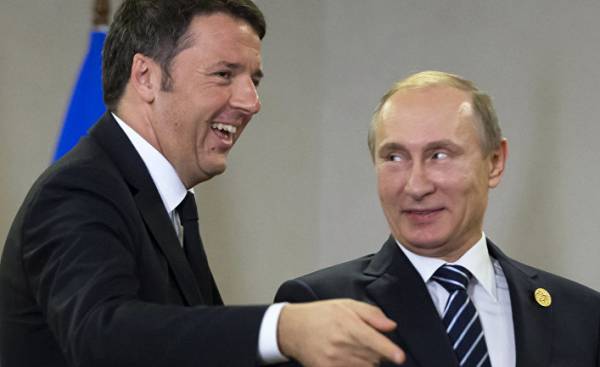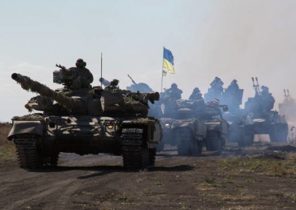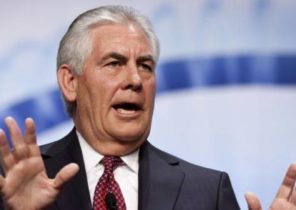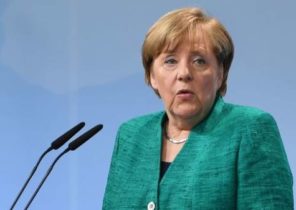
President trump made the most of his short visit to Italy. He arranged a private audience with the Pope, he met with the President and with the Prime Minister in Rome, flew to Sicily for a summit of world leaders and visited American troops at the nearest naval base.
The sudden burst of diplomatic activity sparked by his arrival subsides, and European and American officials fear return to the new reality of the indifference of America. After all, the house administration is struggling with political turmoil and scandals with Russia.
At the same time, Russia is diligently looking for the location in Italy, a country where once existed the largest Communist party outside the Soviet bloc and which many analysts consider the most vulnerable point of the European Union.
In Rome trump left the Embassy without an Ambassador and lost the geopolitical playing field, which operates Moscow’s Ambassador in Rome Sergey Razov.
Sedulously cautious career diplomat Times struggled trying to have a relationship with Italian politicians, organized concerts for the earthquake victims in Italy and attended Italian regional officials, which complain that “unfair” sanctions against Russia, the abolition of which yearns for Moscow.
Next month Times will hold a Grand welcome — the holiday “Day of Russia”, held each year among the chandeliers, coffered ceilings and gilded interiors of his residence, Villa Abamelek.
As energetic diplomacy Razov, a large part of Russia’s relations are built on appearance, as, for example, when the President of Russia Vladimir Putin took the Prime Minister Paolo Gentiloni this month in Sochi with President Sergio Mattarella a few weeks previously in Moscow.
But the Italian, European and American officials fear that Russia is using the same type of backstage influence and deception that was used in the United States and other countries and regions, creating in Italy the odds in favor of Moscow.
Former Prime Minister Matteo Renzi in private conversation, complained to his colleagues that Russia interferes in the politics of his country in supporting the opposition party. And sites controlled by the leader of the “five star Movement”, one of the most popular antidemocratic parties of Italy, distributing messages posted by Sputnik Italia, the Italian version of a news Agency financed by Russia.
“Russia has invested a lot in public opinion in this country,” said Estonian Ambassador to Italy, Celia Kuningas-Saagpakk. Previously, she worked in the Ministry of foreign Affairs of his country, where he watched Russia and its propaganda strategy and tactics in Ukraine and elsewhere.
Russia tried to influence Italy and the consequences of attempts are already visible. Which is not particularly constancy Italian politicians of different views, once interested in business relationships and energy deals, is now cautious because of the position of the EU against Moscow since the seizure of its territory of Ukraine in 2014.
The initiator of this hard approach was the Chancellor of Germany Angela Merkel, who acted as the main link Europe and Russia link. But the deterioration of her relations with Putin in connection with Russia’s intervention in Ukraine has created a split in which, many hope, will be Italy.
Many supporters of Italy in Russia inspired by the recent visit of Prime Minister Gentiloni. His predecessor, Renzi called for Putin at the St. Petersburg international economic forum last year said that he opposes “automatic” renewal of sanctions against Russia. Former Prime Minister Silvio Berlusconi, who once wore the same fur hat as Putin said last month that hopes for a quick lifting of sanctions.
But the most consistent warming in relation to Russia there is a growing “Movement five stars”, which is now, on the eve of elections in Italy, leading in the polls. “Five star movement” called for a referendum on the inclusion of Italy in the Eurozone, the lifting of sanctions against Russia and the actual geopolitical transition from United States to Russia. At a recent presentation of his foreign policy platform in Parliament, the leaders of the “five star Movement” called Russia a strategic partner who is unjustly punished, and the United States is a cruel ally, whose 70-year relationship with Italy has outlived its usefulness.
“There is a limit,” said Manlio Di Stefano, head of the Committee on foreign Affairs, “five star Movement”, referring to the Union of Italy with the United States after the Second world war. Di Stefano said that he had met with the Ambassador Razov, who declined to be interviewed for this article.
In the popular blog “five star Movement” Di Stefano recently wrote that NATO is secretly preparing a “final assault” on Russia. In an interview, he claimed that his party was opposed sanctions against Russia, to relieve the suffering of Italian companies, and lamented that the once promising trump has been disappointing a pawn of the military-industrial complex.
“He said he wants to improve relations with Russia and stabilize the Mediterranean,’ said Di Stefano. — He then began to bomb Syria, which is an ally of Russia.”
Shortly after the election trump Beppe Grillo, co-founder and leader of the “five star Movement”, and many members of the party celebrated its victory, considering it a blow to the establishment. The leaders of the party have approved trump’s remarks about Putin. But because trump’s position towards Russia has become more ambiguous and tense, “Movement five stars” show hidden anti-American sentiment.
Many of the leaders of the movement were present at the meeting last month at a conference organized by David Casaleggio. He — “the grey cardinal “five star Movement”, and his company was distributing content Sputnik Italia.
Grillo was sitting with the mayor of Rome and other leading members of the party, applauding speakers who talked about conspiracy theories, the CIA, and welcoming of WikiLeaks founder Julian Assange. Behind the scenes of Alessandro Di Battista, a leader of the party said that the era of the Italian subordination to the United States ended. According to him, once he comes to power, his party will seek to push Italy from the United States in the direction of Russia, “to a more equidistant point”.
In 2014, the “five star Movement” has moved from criticism of Putin for his violation of human rights to defend the Russian leader. This turn caused among government officials in the United States and Europe suspicions that the party received the Russian financial assistance (Di Battista called it a lie) or electoral assistance in the form of fake news and propaganda through Sputnik. “Now RAI publishes much more fake news than Sputnik,” said Di Stefano, referring to the Italian state broadcaster.
No evidence of receipt of funds “five star Movement” has not appeared. However, some U.S. and European officials see this as the invisible hand of Putin.
“We know that Putin is trying to weaken the EU and its institutions, said in an interview with Senator Bob Corker, a Republican, a member of the Tennessee and Chairman of the Senate Committee on foreign Affairs. He did the same thing in Italy and other countries.”
For the post of Ambassador in Rome, the administration trump is considering the candidacy of Lew Eisenberg, a former Chairman of the Finance Committee of the Republican party. But the administration has refused to give comments about the place of Italy in her worldview, or that inattention entails a risk for Russia’s political advantage.
The American absence was noticed. During a recent visit to the Vatican Senator Tim Kane, a Democrat from Virginia, met with Archbishop Paul Gallagher, Minister of foreign Affairs of the Holy see, which refused to comment on the meeting. “Gallagher was very interested in talking about Russia,” said Kane in an interview.
He recalled that he had discussed with the Archbishop doubt the European allies as to whether it is possible to rely on the assistance of the United States if America failed to protect itself from Russia’s influence. “If U.S. leaves vacuum, Kane recalled the words of Archbishop Gallagher of Europe and countries, he will be someone filled in, and today in most cases, this “someone” turns out to be Russia”.







